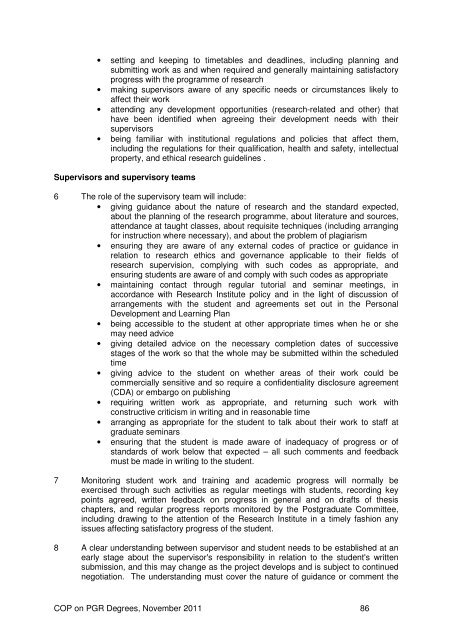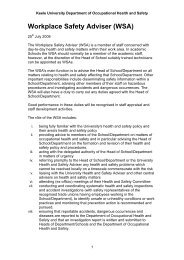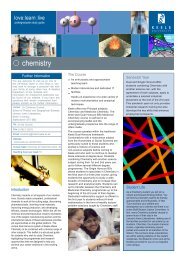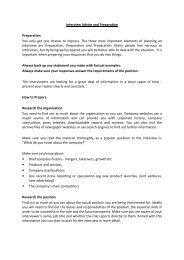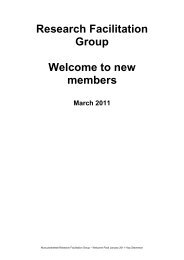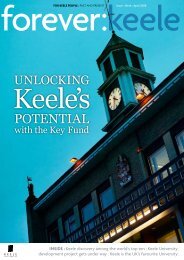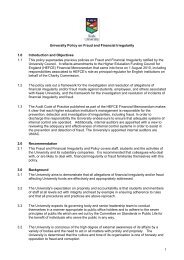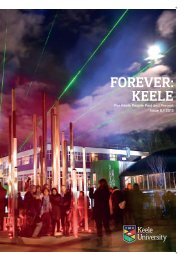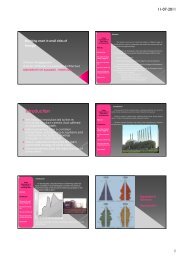keele university code of practice on postgraduate research degrees
keele university code of practice on postgraduate research degrees
keele university code of practice on postgraduate research degrees
Create successful ePaper yourself
Turn your PDF publications into a flip-book with our unique Google optimized e-Paper software.
• setting and keeping to timetables and deadlines, including planning and<br />
submitting work as and when required and generally maintaining satisfactory<br />
progress with the programme <str<strong>on</strong>g>of</str<strong>on</strong>g> <strong>research</strong><br />
• making supervisors aware <str<strong>on</strong>g>of</str<strong>on</strong>g> any specific needs or circumstances likely to<br />
affect their work<br />
• attending any development opportunities (<strong>research</strong>-related and other) that<br />
have been identified when agreeing their development needs with their<br />
supervisors<br />
• being familiar with instituti<strong>on</strong>al regulati<strong>on</strong>s and policies that affect them,<br />
including the regulati<strong>on</strong>s for their qualificati<strong>on</strong>, health and safety, intellectual<br />
property, and ethical <strong>research</strong> guidelines .<br />
Supervisors and supervisory teams<br />
6 The role <str<strong>on</strong>g>of</str<strong>on</strong>g> the supervisory team will include:<br />
• giving guidance about the nature <str<strong>on</strong>g>of</str<strong>on</strong>g> <strong>research</strong> and the standard expected,<br />
about the planning <str<strong>on</strong>g>of</str<strong>on</strong>g> the <strong>research</strong> programme, about literature and sources,<br />
attendance at taught classes, about requisite techniques (including arranging<br />
for instructi<strong>on</strong> where necessary), and about the problem <str<strong>on</strong>g>of</str<strong>on</strong>g> plagiarism<br />
• ensuring they are aware <str<strong>on</strong>g>of</str<strong>on</strong>g> any external <str<strong>on</strong>g>code</str<strong>on</strong>g>s <str<strong>on</strong>g>of</str<strong>on</strong>g> <str<strong>on</strong>g>practice</str<strong>on</strong>g> or guidance in<br />
relati<strong>on</strong> to <strong>research</strong> ethics and governance applicable to their fields <str<strong>on</strong>g>of</str<strong>on</strong>g><br />
<strong>research</strong> supervisi<strong>on</strong>, complying with such <str<strong>on</strong>g>code</str<strong>on</strong>g>s as appropriate, and<br />
ensuring students are aware <str<strong>on</strong>g>of</str<strong>on</strong>g> and comply with such <str<strong>on</strong>g>code</str<strong>on</strong>g>s as appropriate<br />
• maintaining c<strong>on</strong>tact through regular tutorial and seminar meetings, in<br />
accordance with Research Institute policy and in the light <str<strong>on</strong>g>of</str<strong>on</strong>g> discussi<strong>on</strong> <str<strong>on</strong>g>of</str<strong>on</strong>g><br />
arrangements with the student and agreements set out in the Pers<strong>on</strong>al<br />
Development and Learning Plan<br />
• being accessible to the student at other appropriate times when he or she<br />
may need advice<br />
• giving detailed advice <strong>on</strong> the necessary completi<strong>on</strong> dates <str<strong>on</strong>g>of</str<strong>on</strong>g> successive<br />
stages <str<strong>on</strong>g>of</str<strong>on</strong>g> the work so that the whole may be submitted within the scheduled<br />
time<br />
• giving advice to the student <strong>on</strong> whether areas <str<strong>on</strong>g>of</str<strong>on</strong>g> their work could be<br />
commercially sensitive and so require a c<strong>on</strong>fidentiality disclosure agreement<br />
(CDA) or embargo <strong>on</strong> publishing<br />
• requiring written work as appropriate, and returning such work with<br />
c<strong>on</strong>structive criticism in writing and in reas<strong>on</strong>able time<br />
• arranging as appropriate for the student to talk about their work to staff at<br />
graduate seminars<br />
• ensuring that the student is made aware <str<strong>on</strong>g>of</str<strong>on</strong>g> inadequacy <str<strong>on</strong>g>of</str<strong>on</strong>g> progress or <str<strong>on</strong>g>of</str<strong>on</strong>g><br />
standards <str<strong>on</strong>g>of</str<strong>on</strong>g> work below that expected – all such comments and feedback<br />
must be made in writing to the student.<br />
7 M<strong>on</strong>itoring student work and training and academic progress will normally be<br />
exercised through such activities as regular meetings with students, recording key<br />
points agreed, written feedback <strong>on</strong> progress in general and <strong>on</strong> drafts <str<strong>on</strong>g>of</str<strong>on</strong>g> thesis<br />
chapters, and regular progress reports m<strong>on</strong>itored by the Postgraduate Committee,<br />
including drawing to the attenti<strong>on</strong> <str<strong>on</strong>g>of</str<strong>on</strong>g> the Research Institute in a timely fashi<strong>on</strong> any<br />
issues affecting satisfactory progress <str<strong>on</strong>g>of</str<strong>on</strong>g> the student.<br />
8 A clear understanding between supervisor and student needs to be established at an<br />
early stage about the supervisor's resp<strong>on</strong>sibility in relati<strong>on</strong> to the student's written<br />
submissi<strong>on</strong>, and this may change as the project develops and is subject to c<strong>on</strong>tinued<br />
negotiati<strong>on</strong>. The understanding must cover the nature <str<strong>on</strong>g>of</str<strong>on</strong>g> guidance or comment the<br />
COP <strong>on</strong> PGR Degrees, November 2011 86


